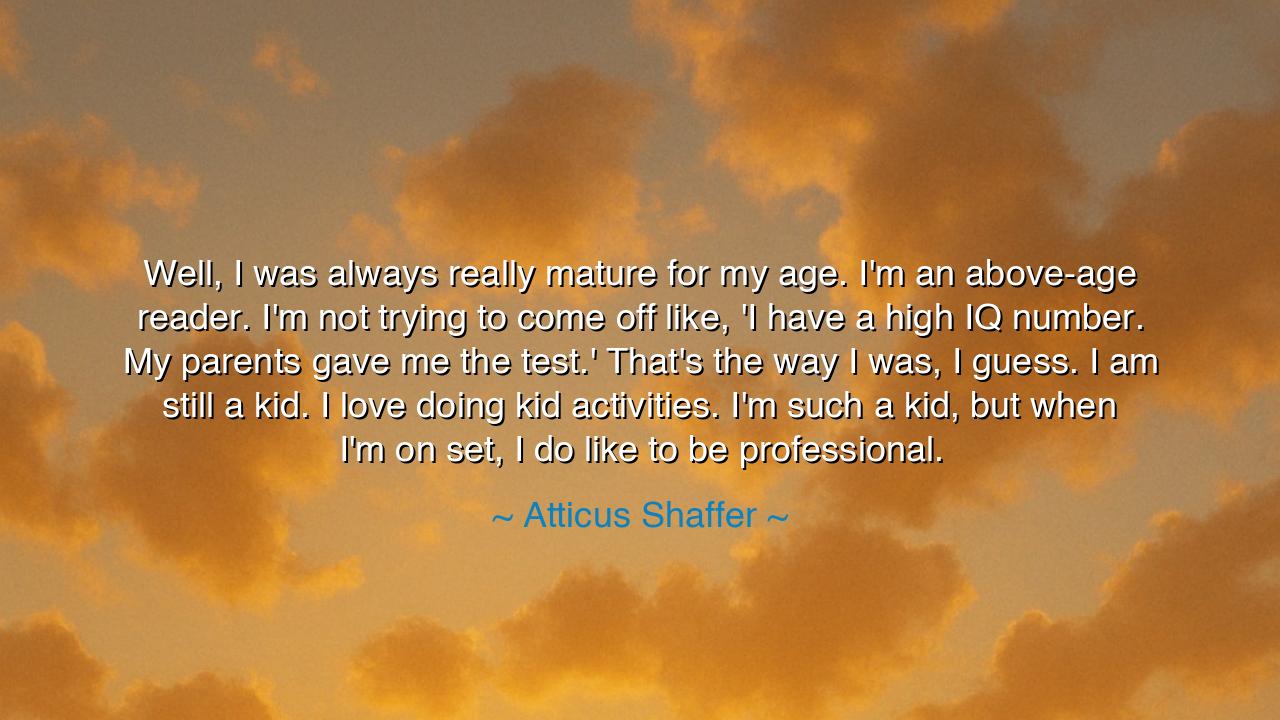
Well, I was always really mature for my age. I'm an above-age
Well, I was always really mature for my age. I'm an above-age reader. I'm not trying to come off like, 'I have a high IQ number. My parents gave me the test.' That's the way I was, I guess. I am still a kid. I love doing kid activities. I'm such a kid, but when I'm on set, I do like to be professional.






The young actor Atticus Shaffer, known for his bright spirit and wisdom beyond his years, once said: “Well, I was always really mature for my age. I’m an above-age reader. I’m not trying to come off like, ‘I have a high IQ number. My parents gave me the test.’ That’s the way I was, I guess. I am still a kid. I love doing kid activities. I’m such a kid, but when I’m on set, I do like to be professional.” In this simple reflection, spoken with sincerity and humility, lies a truth that transcends youth or fame: that maturity is not the loss of innocence, but the mastery of balance — the art of growing wiser without ceasing to be joyful.
The origin of this quote rests in Shaffer’s life as a child actor, known to millions for his role as Brick Heck in The Middle. From a young age, he found himself in the strange dual world of childhood and professionalism — one where play and discipline must walk hand in hand. While other children spent their days in carefree leisure, he was learning lines, keeping schedules, and working among adults. Yet, unlike many who grow old too soon beneath the weight of expectation, Shaffer preserved his childlike heart. His words reveal the quiet wisdom of one who understands that maturity is not about age or intellect, but about how one carries responsibility while remaining true to one’s nature.
His statement also reflects a humility rare in the young — for though he acknowledges being “mature” and “an above-age reader,” he hastens to deny arrogance. He does not claim genius, nor boast of his talents; instead, he grounds his gifts in gratitude and simplicity. Such humility is the mark of true maturity. For the wise know that the moment one begins to worship one’s own intelligence, the soul begins to wither. Knowledge without humility is vanity, but knowledge joined with innocence becomes wisdom.
This balance between childhood and maturity recalls the tale of Mozart, who, like Shaffer, was a prodigy surrounded by adults and expectations. At five, he composed music fit for kings; at eight, he performed before emperors. Yet those who knew him said that offstage, he remained full of laughter, mischief, and play. Even at the height of his fame, he preserved his inner child — the same wonder that breathed life into his art. The lesson is clear: greatness is not found in abandoning youthfulness, but in keeping its fire alight while learning the discipline that gives it direction.
To be “professional on set,” as Shaffer says, is not merely to follow rules or impress others; it is to honor one’s purpose. It is the awareness that talent is sacred, and that every gift carries a duty. When he speaks of loving “kid activities” yet being serious about his work, he is describing the balance that all souls must learn: to play with joy and to labor with devotion. This is the path of wholeness — where neither innocence nor duty devours the other, but both enrich the spirit.
There is deep wisdom here for all, not only for the young. In our pursuit of success, many forget how to be children — how to laugh, wonder, and take delight in simple things. And in our pursuit of leisure, many forget the dignity of effort, the grace of self-discipline. Atticus Shaffer’s words, though spoken with youthful modesty, remind us that the true measure of growth is not in leaving childhood behind, but in carrying its light into adulthood. To be mature is to know when to stand firm — and to be childlike is to know when to dance.
The lesson is this: never let maturity harden your heart, nor let youth make you careless. Live with the curiosity of a child and the steadiness of a sage. Whatever your stage in life, give your best to your calling, yet keep a corner of your soul untouched by cynicism — a place where joy still plays. For wisdom without laughter is cold, and innocence without purpose is fleeting. When both dwell together, the spirit becomes whole.
Thus remember, O seeker of balance: life is a stage where the soul must learn to play many roles. Be earnest in your work, humble in your learning, yet free in your joy. Let your heart remain young even as your mind grows wise. For as Atticus Shaffer shows us, the secret of true maturity is not the loss of childhood — it is its preservation within wisdom.






AAdministratorAdministrator
Welcome, honored guests. Please leave a comment, we will respond soon